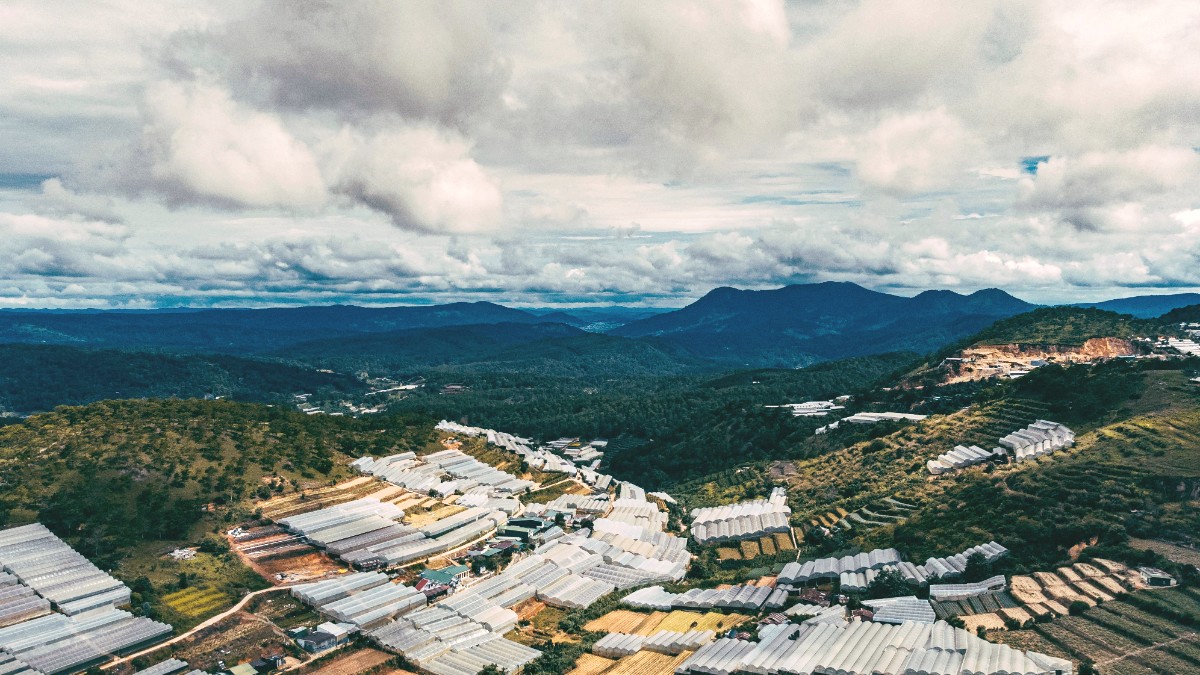
Vietnam
Dalat's climate has two distinct seasons: a dry season and a rainy season.
Average daily temperatures typically range from 15°C to 24°C (59°F to 75°F). Mornings and evenings often feel cool, with temperatures dropping to 10°C (50°F) or even lower during the dry season, specifically from December to February. Days are generally pleasant and mild. The cool evenings mean you will often need a Light jacket or sweater, even in what might seem like warmer months. This consistent mildness characterizes Dalat's climate.
Your choice of travel time can influence your experience, from crowd levels to prices.
High Season (November - March/April): Ideal weather with cool, dry, and sunny days. Perfect for outdoor activities and sightseeing. Many flower festivals happen during this period. Expect higher prices for accommodation and flights, especially around Vietnamese public holidays like Tet Lunar New Year. Crowds are larger at popular attractions. Book well in advance.
Shoulder Season (April - May and October - November): April - May marks transition from dry to rainy season; showers increase towards May. Fewer crowds, potentially lower prices. October - November marks the end of the rainy season; some lingering showers, but more frequent sunny days. Good balance of pleasant weather and fewer tourists.
Low Season (June - September): Coincides with the heart of the rainy season. Lowest prices for accommodation and tours, fewer tourists. Frequent afternoon rains might disrupt outdoor plans. Plan flexible itineraries and consider indoor activities.
November - March/April
Optimal weather for activities, flower festivals.
Higher prices, more crowded, especially around holidays.
April - May & October - November
Fewer crowds, potentially better prices, pleasant weather mix.
Possible lingering showers in October/November, warmer in April/May.
June - September
Lowest prices for accommodation and tours, fewer tourists, relaxed experience.
Frequent afternoon rains, outdoor plans disrupted, some activities less enjoyable.
The peak bloom for many of Dalat's famous flowers typically happens from December to March. The Dalat Flower Festival, a major event, usually takes place in December or January, drawing many visitors eager to see the city in full bloom.
The dry season (November to April) presents the best conditions for outdoor adventures. Trails are less slippery, and the weather is consistently sunny and cool, making activities safer and more enjoyable. Canyoning is especially favored during these months.
December - March (Dry Season)
November - April (Dry Season)
Year-round, best in November - April
Year-round, more pleasant in dry season
Dry Season for clear skies, Rainy Season for lush greenery
Navigating Vietnam's visa and entry rules forms a part of your travel preparation.
Vietnam offers several visa options depending on your nationality and planned length of stay.
Regardless of the visa type, several documents consistently allow entry into Vietnam.
Dalat welcomes various budgets, from backpackers to luxury travelers.
Consult a healthcare professional for up-to-date routine vaccinations and recommendations for Hepatitis A/B, Typhoid, Rabies, and Japanese Encephalitis.
Drink only bottled water or water from sealed containers. Choose thoroughly cooked food from busy street stalls. A personal Water purification filter like a Sawyer Mini can be used.
Dengue fever exists. Use Insect repellent with DEET or Picaridin, wear long sleeves/pants, especially during dawn/dusk.
Dalat is generally safe for tourists; violent crime is rare.
Petty crime, like bag snatching or pickpocketing, can occur in crowded areas (markets, bus stations). Maintain awareness of your surroundings.
Secure your belongings using a cross-body bag or a Money belt. Avoid displaying large amounts of cash or expensive items. Be cautious with phones in public near roads.
Natural hazards include landslides during heavy rain (May-October) and localized flooding in low-lying areas. Exercise caution at waterfalls, as paths can be slippery.
Dalat has general hospitals (e.g., Lam Dong General Hospital) for common issues. Smaller clinics are available for minor ailments. For serious conditions, care in Ho Chi Minh City or Bangkok is advisable.
Widely available, pharmacists often recommend over-the-counter medications.
Police: 113, Fire: 114, Ambulance: 115. Keep your embassy/consulate contacts ready.
Ensure your well-being with these safety points.
Estimated daily costs by travel style (approximate and may vary).
US$14-30/day (Hostel: $6-12, Meals: $4-8, Transport: $2-4, Attractions: $2-6)
US$40-80/day (Hotel: $20-50, Meals: $10-20, Transport: $4-10, Attractions: $6-12)
US$100-280+/day (High-end Hotel: $60-200+, Meals: $30-60+, Transport: $12-30+, Attractions: $12-30+)
Keep photocopies or digital images of your passport, visa, and insurance policy separate from the originals. This proves helpful if documents are lost or stolen.